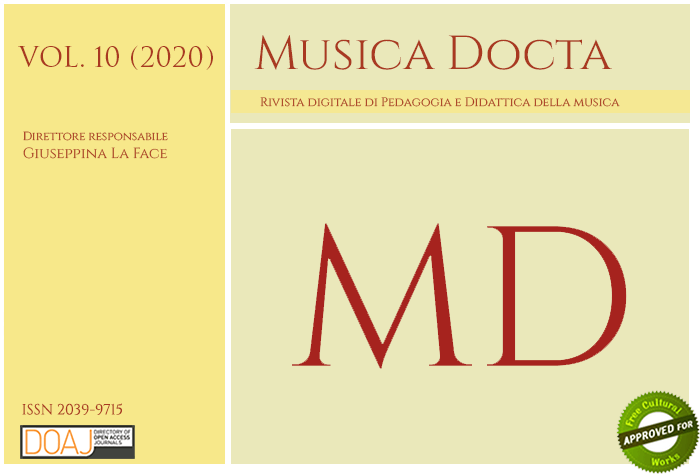Mélophrasis, parafrasi ed analisi: Haydn, Momigny e la “103”
DOI:
https://doi.org/10.6092/issn.2039-9715/11947Keywords:
Melophrases, Musical analysis, Jérôme-Joseph Momigny, Joseph Haydn, Sonata formAbstract
In his Cours complet d’harmonie et de composition (1806) Jérôme-Joseph Momigny offered both a paraphrase of the first movement of W.A. Mozart’s D minor Quartet K 421, and a double analysis of the first movement of Joseph Haydn’s Symphony no. 103 in E flat major. In the first case, he matched the phrases of Mozart’s composition to the verses of a fictional quarrel between Dido and a runaway Aeneas, providing both a harmonic and structural analysis at the same time. In the case of Haydn, a first, essentially formal analysis is complemented by an analyse pittoresque et poétique conceived as a dramatisation: the subject illustrates the contrasting reactions of the peasants to the threat of a storm, their prayers, comments, banters, and ensuing squabbles.
In both cases Momigny segments the composition into ‘periods’ that convey complete meaning. Therefore, he does not rely on a pre-established morphological model – the very idea of sonata form had not yet been formulated in 1806 – but seeks logical and formal links in the narrative coherence resulting from the succession and concatenation of musical periods. This translation into words of a complex, multi-layered construct like the first movement of Haydn’s symphony is no doubt arbitrary, but not inappropriate. However, it has the merit of reducing the gap between poor denotation and lavish connotation that is peculiar to musical language.
Moreover, in itself the very beginning of Symphony no. 103 gives a textbook example of the limits that constrain the power of the word vis-à-vis musical language. Indeed, the sources give no indication on how to perform the “drum-roll” that made it famous.
Downloads
Published
How to Cite
Issue
Section
License
Copyright (c) 2020 Lorenzo Bianconi

This work is licensed under a Creative Commons Attribution-ShareAlike 3.0 Unported License.




